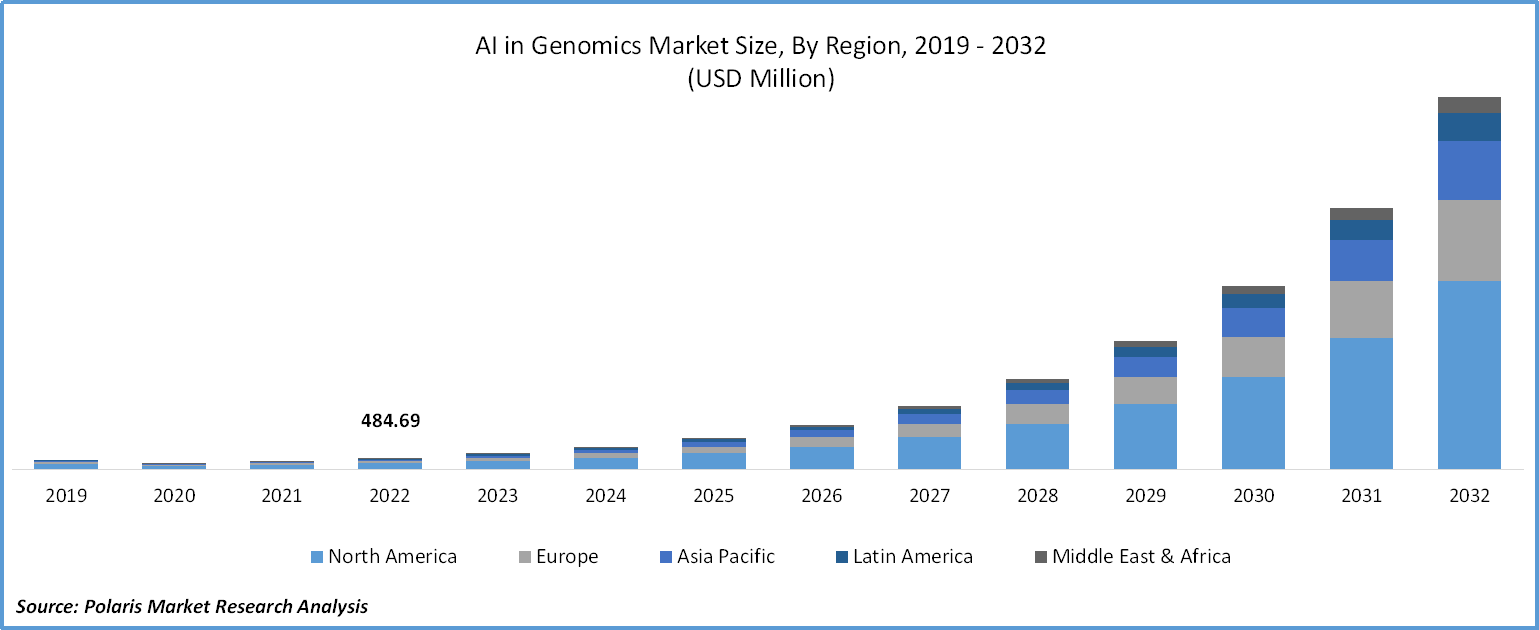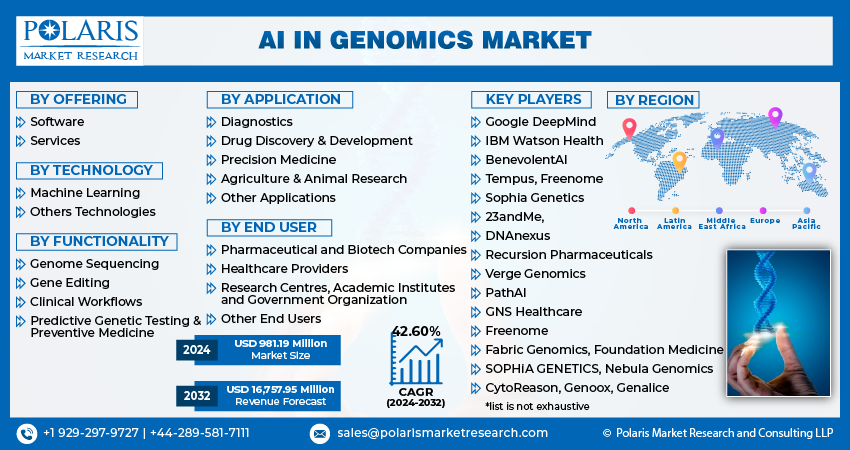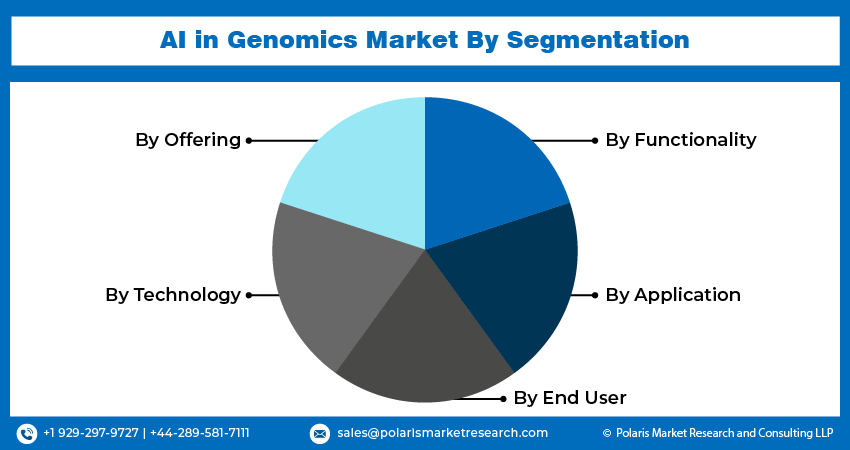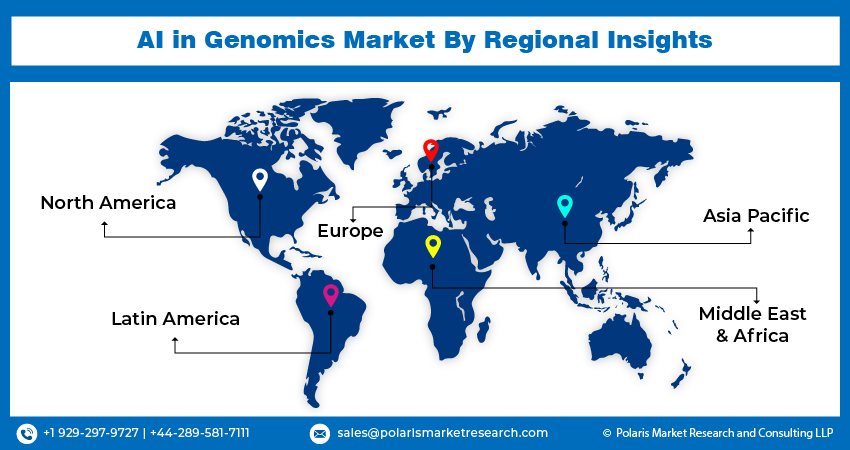
AI in Genomics Market Share, Size, Trends, Industry Analysis Report, By Offering (Software, Services), By Technology, By Functionality, By Application, By End User, By Region, Segment Forecast, 2024 - 2032
- Published Date:Jan-2024
- Pages: 115
- Format: PDF
- Report ID: PM3611
- Base Year: 2023
- Historical Data: 2019-2022
Report Outlook
The global AI in genomics market was valued at USD 689.47 million in 2023 and is expected to grow at a CAGR of 42.60% during the forecast period. AI technologies, particularly machine learning, and deep learning algorithms, have made significant strides in analyzing genomic data. The ability to rapidly extract valuable insights from genomic data has accelerated genomics research and contributed to the Market's growth.

To Understand More About this Research: Request a Free Sample Report
Researchers have created an Artificial Intelligence (AI) tool to forecast how well genome editing repair choices will work, minimizing mistakes in treating genetic illnesses. This breakthrough technology improves accuracy, accelerates the development of genetic disease treatments, facilitates personalized medicine, and spurs the adoption of AI technologies in genomics research and clinical practice. The development of prime editing as a precise genome editing method, coupled with the integration of AI technologies, drives the growth of AI in the genomics market.
Industry Dynamics
Growth Drivers
The exponential growth of biomedical research projects and large-scale collaborations has led to a substantial increase in the generation of genomic data. An estimated 2 to 40 million gigabytes of data are generated annually. This surge in genomic data production is a key driving force behind the growth of the AI in genomics market.
AI technologies, including machine learning and deep learning algorithms, are being employed to handle and analyze such vast amounts of data. These AI-driven solutions enable researchers to extract valuable insights and accelerate discoveries in genomics research. Consequently, the demand for AI in genomics is rising as it plays a pivotal role in managing and interpreting the ever-expanding volume of genomic data, thereby driving the growth of the Market.

Report Segmentation
The market is primarily segmented based on offering, technology, functionality, application, end user and region.
|
By Offering |
By Technology |
By Functionality |
By Application |
By End User |
By Region |
|
|
|
|
|
|
To Understand the Scope of this Report: Speak to Analyst
The software segment is projected to witness faster growth in the forecast period.
The software segment is expected to have faster growth in the market. Genomics research generates massive amounts of data, and AI-powered software is essential for processing, analyzing, and interpreting this data. The growing complexity and volume of genomic data require advanced algorithms and software tools to uncover meaningful insights. AI technology constantly evolves, and software companies are developing more sophisticated algorithms and techniques tailored for genomics. These advancements enable researchers and clinicians to extract valuable information from genomic data more accurately and efficiently. AI-powered software offers cost-effective and scalable solutions for genomics research and analysis.
The machine learning segment is expected to have a larger revenue share.
The machine learning segment holds the largest market share in the study period. Among the sub-segments of machine learning, deep learning is driving the growth of AI in the genomics market. Deep learning is a type of machine learning that uses artificial neural networks with multiple layers to analyze and process complex data. Genomics generates vast amounts of data, including DNA sequencing, gene expression profiles, and clinical data. Machine learning algorithms can handle and analyze these large and complex datasets, extracting patterns and insights that can aid in understanding diseases, identifying biomarkers, and personalizing treatments. As the volume and complexity of genomics data grow, the demand for machine learning techniques to process and interpret this data will increase.
The Genome Sequencing segment is expected to hold the larger revenue share.
The Genome Sequencing segment is projected to witness a larger revenue share in the coming years. It involves determining the complete DNA sequence of an individual's genome. Genomics has seen significant advancements in DNA sequencing technologies, such as next-generation sequencing (NGS) and single-molecule sequencing. These technologies have led to a substantial reduction in sequencing costs and an increase in throughput, making genome sequencing more accessible and affordable. Integrating AI in genome sequencing workflows enables more accurate and efficient analysis of the generated sequencing data.
Precision Medicine is expected to witness higher growth in the market.
Precision Medicine garnered the highest growth in the study period. Precision medicine identifies individuals at increased risk of developing specific diseases and implements preventive measures. AI-driven genomics analysis helps predict how individuals will respond to medications based on their genetic profile. Pharmacogenomics, the study of how an individual's genetic makeup influences drug response, is a critical aspect of precision medicine. Researchers and clinicians can use AI algorithms to identify genetic markers influencing drug metabolism, efficacy, and adverse reactions, leading to personalized drug selection and dosing. In 2016, China initiated the Precision Medicine Initiative to establish a nationwide precision medicine database encompassing 100 million individuals by 2030. This initiative emphasizes the integration of genomics and AI technologies. It will further create a wide range of opportunities for the market in the coming years.
Pharmaceutical and Biotech Companies are projected to witness significant revenue share in the forecast period.
Pharmaceutical and Biotech Companies are expected to have significant revenue for the market. AI in genomics has the potential to revolutionize the drug discovery and development process. Pharmaceutical and biotech companies use AI algorithms to analyze large-scale genomics datasets, identify disease targets, and optimize drug design. This integration of AI expedites the identification of potential drug candidates, reduces development time, and enhances the efficiency of clinical trials. As a result, pharmaceutical and biotech companies can bring new drugs to market faster, generating significant revenue.

North America garnered higher growth and a larger revenue share in the forecast period
North America is expected to witness higher growth and a larger revenue share for the market. It strongly emphasizes precision medicine, which utilizes genomics and AI to personalize medical treatments. North America, particularly the United States, is at the forefront of AI and genomics research and development. The region has a robust ecosystem of technology companies, research institutions, and healthcare providers dedicated to advancing AI in genomics. The convergence of expertise, resources, and investments in North America accelerates innovation and drives the market's growth. The United States government has actively supported AI research and development through initiatives like the National Artificial Intelligence Research and Development Strategic Plan. This plan emphasizes the importance of AI in areas including healthcare and genomics.
Europe is projected to witness a higher growth rate for the market. Public-private partnerships, along with EU-funded projects, drive the commercialization of AI in genomics, leading to a significant revenue share in the region. The Horizon Europe (2021-2027) program, with a budget of over €95 million, is an important driver of market growth in Europe. As the European Union's (EU's) primary funding initiative for research and innovation, Horizon Europe focuses on three pillars: excellent science, global challenges, industrial competitiveness, and innovative Europe. Under the pillar of excellent science, substantial funding is allocated to support cutting-edge research in genomics and AI. This funding facilitates advancements in AI algorithms, genomic analysis techniques, and AI-enabled tools specific to genomics research. These developments drive the market's growth in Europe by providing the necessary resources for innovation and technological progress.

Competitive Insight
Some of the major players operating in the global market include Google DeepMind, IBM Watson Health, BenevolentAI, Tempus, Freenome, Sophia Genetics, 23andMe, DNAnexus, Recursion Pharmaceuticals, Verge Genomics, PathAI, GNS Healthcare, Freenome, Fabric Genomics, Foundation Medicine, SOPHiA GENETICS, Nebula Genomics, CytoReason, Genoox, Genalice, Deep Genomics, Owkin, Genialis, Gencove, Helix, QIAGEN Bioinformatics, SOPHiA DDM, WuXi NextCODE, Genuity Science, Lifebit, Envisagenics, ZS Genetics, MedGenome, Cypher Genomics, PierianDx, Bluebee, Repositive, Precision for Medicine, Shivom & Bluegnome.
Recent Developments
- In May 2023, 9xchange, a biopharma marketplace facilitating the exchange of drug assets, announced a partnership with BenevolentAI, a prominent company specializing in AI-enabled drug discovery and development.
- In February 2023, Tempus, a prominent artificial intelligence (AI) and precision medicine player revealed a strategic collaboration with Pfizer. The partnership spans multiple years and aims to advance AI and machine learning-driven initiatives in therapeutic development.
AI in Genomics Market Report Scope
|
Report Attributes |
Details |
|
Market size value in 2024 |
USD 981.19 million |
|
Revenue forecast in 2032 |
USD 16,757.95 million |
|
CAGR |
42.60% from 2024 - 2032 |
|
Base year |
2023 |
|
Historical data |
2019 - 2022 |
|
Forecast period |
2024 - 2032 |
|
Quantitative units |
Revenue in USD million and CAGR from 2024 to 2032 |
|
Segments covered |
By Offering, By Technology, By Functionality, By Application, By End User, By Region |
|
Regional scope |
North America, Europe, Asia Pacific, Latin America; Middle East & Africa |
|
Key companies |
Google DeepMind, IBM Watson Health, BenevolentAI, Tempus, Freenome, Sophia Genetics, 23andMe, DNAnexus, Recursion Pharmaceuticals, Verge Genomics, PathAI, GNS Healthcare, Freenome, Fabric Genomics, Foundation Medicine, SOPHiA GENETICS, Nebula Genomics, CytoReason, Genoox, Genalice, Deep Genomics, Owkin, Genialis, Gencove, Helix, QIAGEN Bioinformatics, SOPHiA DDM, WuXi NextCODE, Genuity Science, Lifebit, Envisagenics, ZS Genetics, MedGenome, Cypher Genomics, PierianDx, Bluebee, Repositive, Precision for Medicine, Shivom & Bluegnome. |
FAQ's
The global AI in genomics market size is expected to reach USD 16,757.95 million by 2032.
Key players in the ai in genomics market are Google DeepMind, IBM Watson Health, BenevolentAI, Tempus, Freenome, Sophia Genetics, 23andMe, DNAnexus.
North America contribute notably towards the global ai in genomics market.
The global AI in genomics market is expected to grow at a CAGR of 42.5% during the forecast period.
The ai in genomics market report covering key segments are offering, technology, functionality, application, end user and region.
